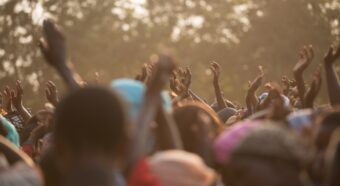African Constituencies Powerful Voice at the Global Fund because of Strong Collaboration
- December 18, 2021
- Africa / African Constituencies
- By Armelle Nyobe

The two African constituencies are represented mostly in pairs at the Global Fund three committees (the Strategy, Ethics and Governance; and at the Audit and Finances committees) and at the Board by the committee, board and alternate members representing the West and Central Africa and the East and South Africa. Both regions combine 46 African countries with 2 voting voices at the board over 20 from other constituencies sitting at the same board. It is important to note the efforts invested in by the African representatives to ensure the African voice is well shaped, heard and leads to results.
The ACB runs the detailed preparation to support the African representatives through a series of consultations, discussions, collecting views on every matter and therefore agree on African priorities. On the GF calendars, each of the three committees meets thrice while the board meets twice every year respectively unless there is need for an extra-ordinary board session.
Situation room
Despite Covid-19 pandemic disruption, about ten African representatives (1 or 2 per each of the 3 committees and 1 per each of the 2 constituencies at the board) and ACB have managed to virtually, successfully, collectively, and collaboratively meet via situation room to discuss in detail African matters when it comes to fight HTM before any series of meetings (committees and the board). The situation room is a place where the African crew goes through the documents to be tabled at the meetings, strategize on how to consult (i) countries via implementer governments, communities, CSOs and CCMs and (ii) other constituencies sitting at the GF board.
Why this togetherness?
The African delegation composed of African representatives at the 3 committees and the board, and the ACB, committed to run this together because it permits them to take into consideration the African context in general after exchanging on priorities and context of each of the region (Central, West, East, and South) in particular. This togetherness and the extensive consultations have been contributing a lot in setting up the African tone, it is also a good pillar to build on setting each region’s priorities, addressing them strategically together and regularly advocating to others GF constituencies. The ACB develops position statements on each of the specific matters for submission to the GF after approval by each of the African representatives.
Bilateral talk
The African delegation constantly schedules to meet other voting constituencies through what ACB calls bilateral talks: with the major purpose of intensifying the African voice, seeking support on the African position, and exploring the opportunities for common position on a specific agenda item. This is a regular exercise that takes place every time prior the committee and the board meetings and on specific and crucial matters for the continent. This discipline has contributed a lot during the development of the next GF strategy which has been a hot discussion throughout 2021.
Challenges and next Focus
Time
Representing 46 countries, extensive consultations with countries and bilaterals, going through data and trend, discussing on various milestones and regional context, have not been very feasible due to limited time.
On the other hand, read the several documents that require to be summarized and analyzed take a lot of time and human resources not mentioning strategizing on the way forward, yet the documents are released very few days prior to the committee and board meetings.
The different time zones and “hypothetic” internet connectivity have been an issue especially because the African delegation committed to take up the journey collectively and collaboratively together.
Next focus
In addition to the above stated discipline, the African delegation considers increasing collaboration with implementer governments as well as community and CSOs as it has been the focus while developing the ACB 2022-2025 Strategy, the 2022 Business Plan and the 2022-2025 Advocacy Strategy recently approved by African constituencies countries.
The African representatives have also agreed to increase bilateral talks with the non-voting constituencies and technical partners.
Lastly but not least, the African crew used to meet at the end of each day during the meeting season, to discuss again on the different position statements vs the African’s and the voting on specific matters. But recently, they also agreed on exchanging after all meetings to reflect on what has worked well and what needs to be improved so that it is also included in the feedback notes to countries.
Christelle Muvunyi


